浙江大学医学免疫学名词解释
医学免疫学名词解释和大题1
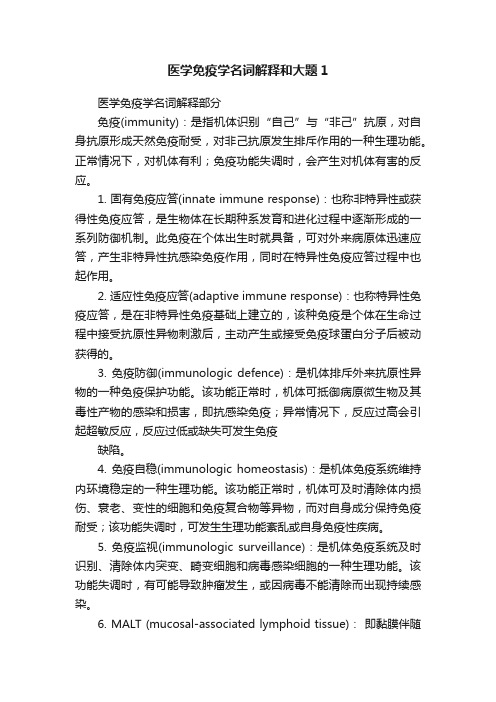
医学免疫学名词解释和大题1医学免疫学名词解释部分免疫(immunity):是指机体识别“自己”与“非己”抗原,对自身抗原形成天然免疫耐受,对非己抗原发生排斥作用的一种生理功能。
正常情况下,对机体有利;免疫功能失调时,会产生对机体有害的反应。
1. 固有免疫应答(innate immune response):也称非特异性或获得性免疫应答,是生物体在长期种系发育和进化过程中逐渐形成的一系列防御机制。
此免疫在个体出生时就具备,可对外来病原体迅速应答,产生非特异性抗感染免疫作用,同时在特异性免疫应答过程中也起作用。
2. 适应性免疫应答(adaptive immune response):也称特异性免疫应答,是在非特异性免疫基础上建立的,该种免疫是个体在生命过程中接受抗原性异物刺激后,主动产生或接受免疫球蛋白分子后被动获得的。
3. 免疫防御(immunologic defence):是机体排斥外来抗原性异物的一种免疫保护功能。
该功能正常时,机体可抵御病原微生物及其毒性产物的感染和损害,即抗感染免疫;异常情况下,反应过高会引起超敏反应,反应过低或缺失可发生免疫缺陷。
4. 免疫自稳(immunologic homeostasis):是机体免疫系统维持内环境稳定的一种生理功能。
该功能正常时,机体可及时清除体内损伤、衰老、变性的细胞和免疫复合物等异物,而对自身成分保持免疫耐受;该功能失调时,可发生生理功能紊乱或自身免疫性疾病。
5. 免疫监视(immunologic surveillance):是机体免疫系统及时识别、清除体内突变、畸变细胞和病毒感染细胞的一种生理功能。
该功能失调时,有可能导致肿瘤发生,或因病毒不能清除而出现持续感染。
6. MALT (mucosal-associated lymphoid tissue):即黏膜伴随的淋巴组织。
是指分布在呼吸道、肠道及泌尿生殖道的粘膜上皮细胞下的无包膜的淋巴组织。
除执行固有免疫外,还可执行局部特异性免疫。
免疫学名词解释完整版

免疫(Immunity): 是对抗原的识别和清除。
其核心是机体识别“自我”与“非我(异己)”、产生免疫应答,以清除“异己”抗原或者诱导免疫耐受,从而维持自身内环境稳定。
免疫学(Immunology): 研究免疫系统结构与功能的学科, 涉及免疫识别、免疫应答、免疫耐受与免疫调节等免疫学的基本科学规律与机制研究;以及免疫机制在相关疾病发生发展中的作用和免疫学技术在疾病诊断、治疗与预防中的应用。
免疫应答(Immune response):指机体免疫系统受抗原刺激后,淋巴细胞特异性识别抗原分子,发生活化、增生、分化或无能、凋亡,进而表现出一定生物学效应的全过程。
免疫反应:指免疫应答过程中所产生的抗体和致敏淋巴细胞与相应抗原特异性结合所发生的反应。
免疫调理:凡是能增强吞噬细胞吞噬功能的就叫免疫调理。
固有免疫:是生物体在长期种系进化过程中形成的一系列防御机制,是机体的第一道防线,也是特异性免疫的基础。
免疫原性:抗原能刺激特异性免疫细胞,使之活化、增殖、分化,最终产生免疫效应物质(抗体和致敏淋巴细胞)。
决定免疫原性的因素:抗原的异物性;抗原的理化性质;宿主的遗传因素、年龄、性别、健康状态;抗原进入机体的剂量、途径、次数以及佐剂。
免疫耐受:是机体的免疫系统接触某种抗原后形成的特异性免疫无应答状态,表现为再次接触同一抗原时,不发生可查见的反应,是一种特殊的免疫应答。
免疫球蛋白:是指具有抗体(antibody, Ab)活性或在化学结构上与抗体相似的一类球蛋白, 主要存在于体液中(分泌型),也可存在于B细胞膜上(膜型)。
(AID)自身免疫病:自身免疫应答并非必然引起自身免疫病,仅当自身免疫应答过强或持续时间过长、以致破坏自身正常组织结构并引起相应临床症状时,才导致自身免疫病。
(IDD)免疫缺陷病(immunodeficiengcy disease,):是由免疫系统先天发育障碍或后天损伤而使免疫细胞的发育、分化、增殖和代谢异常,并导致免疫功能障碍所出现的临床综合征。
免疫学名词解释
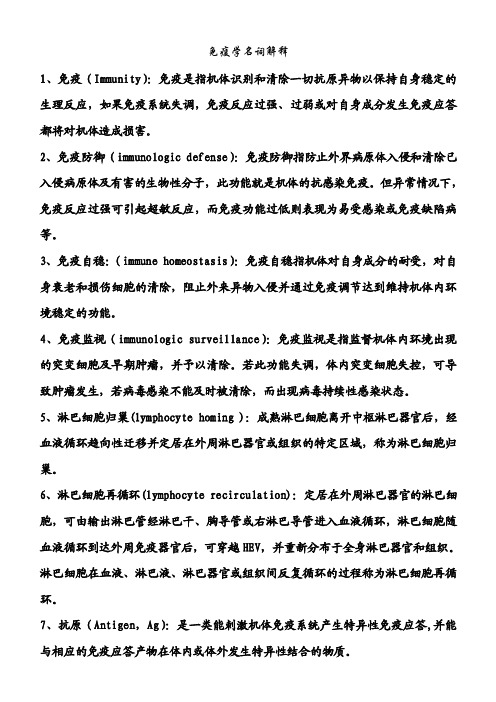
免疫学名词解释1、免疫(Immunity):免疫是指机体识别和清除一切抗原异物以保持自身稳定的生理反应,如果免疫系统失调,免疫反应过强、过弱或对自身成分发生免疫应答都将对机体造成损害。
2、免疫防御(immunologic defense):免疫防御指防止外界病原体入侵和清除已入侵病原体及有害的生物性分子,此功能就是机体的抗感染免疫。
但异常情况下,免疫反应过强可引起超敏反应,而免疫功能过低则表现为易受感染或免疫缺陷病等。
3、免疫自稳:(immune homeostasis):免疫自稳指机体对自身成分的耐受,对自身衰老和损伤细胞的清除,阻止外来异物入侵并通过免疫调节达到维持机体内环境稳定的功能。
4、免疫监视(immunologic surveillance):免疫监视是指监督机体内环境出现的突变细胞及早期肿瘤,并予以清除。
若此功能失调,体内突变细胞失控,可导致肿瘤发生,若病毒感染不能及时被清除,而出现病毒持续性感染状态。
5、淋巴细胞归巢(lymphocyte homing ):成熟淋巴细胞离开中枢淋巴器官后,经血液循环趋向性迁移并定居在外周淋巴器官或组织的特定区域,称为淋巴细胞归巢。
6、淋巴细胞再循环(lymphocyte recirculation):定居在外周淋巴器官的淋巴细胞,可由输出淋巴管经淋巴干、胸导管或右淋巴导管进入血液循环,淋巴细胞随血液循环到达外周免疫器官后,可穿越HEV,并重新分布于全身淋巴器官和组织。
淋巴细胞在血液、淋巴液、淋巴器官或组织间反复循环的过程称为淋巴细胞再循环。
7、抗原(Antigen,Ag):是一类能刺激机体免疫系统产生特异性免疫应答,并能与相应的免疫应答产物在体内或体外发生特异性结合的物质。
2 免疫原性(Immunogenicity):是指抗原能刺激特定的免疫细胞(克隆),使之活化、增殖、分化,产生免疫效应物质(抗体和致敏淋巴细胞)的特性.免疫反应性(Immunoreactivity);也称抗原性(Antigenicity):是指抗原与相应的免疫效应物质(抗体或/和致敏淋巴细胞),在体内体外发生特异性结合的特性. 8、半抗原(hapten):仅有免疫反应性而无免疫原性的物质。
医学免疫学名词解释
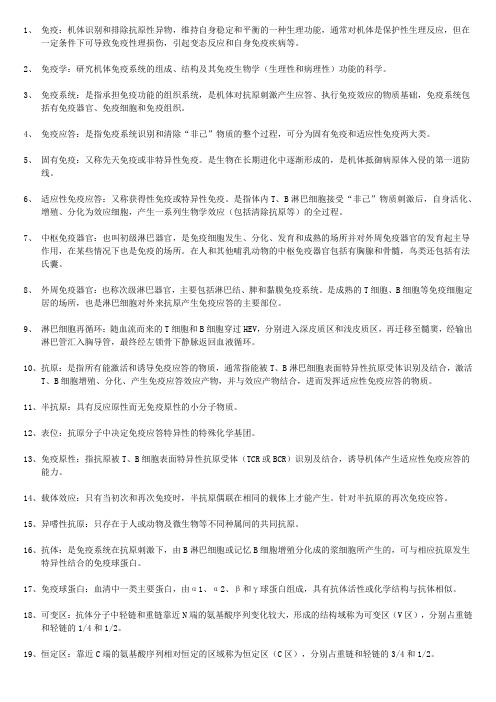
1、免疫:机体识别和排除抗原性异物,维持自身稳定和平衡的一种生理功能,通常对机体是保护性生理反应,但在一定条件下可导致免疫性理损伤,引起变态反应和自身免疫疾病等。
2、免疫学:研究机体免疫系统的组成、结构及其免疫生物学(生理性和病理性)功能的科学。
3、免疫系统:是指承担免疫功能的组织系统,是机体对抗原刺激产生应答、执行免疫效应的物质基础,免疫系统包括有免疫器官、免疫细胞和免疫组织。
4、免疫应答:是指免疫系统识别和清除“非己”物质的整个过程,可分为固有免疫和适应性免疫两大类。
5、固有免疫:又称先天免疫或非特异性免疫。
是生物在长期进化中逐渐形成的,是机体抵御病原体入侵的第一道防线。
6、适应性免疫应答:又称获得性免疫或特异性免疫。
是指体内T、B淋巴细胞接受“非己”物质刺激后,自身活化、增殖、分化为效应细胞,产生一系列生物学效应(包括清除抗原等)的全过程。
7、中枢免疫器官:也叫初级淋巴器官,是免疫细胞发生、分化、发育和成熟的场所并对外周免疫器官的发育起主导作用,在某些情况下也是免疫的场所。
在人和其他哺乳动物的中枢免疫器官包括有胸腺和骨髓,鸟类还包括有法氏囊。
8、外周免疫器官:也称次级淋巴器官,主要包括淋巴结、脾和黏膜免疫系统。
是成熟的T细胞、B细胞等免疫细胞定居的场所,也是淋巴细胞对外来抗原产生免疫应答的主要部位。
9、淋巴细胞再循环:随血流而来的T细胞和B细胞穿过HEV,分别进入深皮质区和浅皮质区,再迁移至髓窦,经输出淋巴管汇入胸导管,最终经左锁骨下静脉返回血液循环。
10、抗原:是指所有能激活和诱导免疫应答的物质,通常指能被T、B淋巴细胞表面特异性抗原受体识别及结合,激活T、B细胞增殖、分化、产生免疫应答效应产物,并与效应产物结合,进而发挥适应性免疫应答的物质。
11、半抗原:具有反应原性而无免疫原性的小分子物质。
12、表位:抗原分子中决定免疫应答特异性的特殊化学基团。
13、免疫原性:指抗原被T、B细胞表面特异性抗原受体(TCR或BCR)识别及结合,诱导机体产生适应性免疫应答的能力。
医学免疫学_名词解释整理
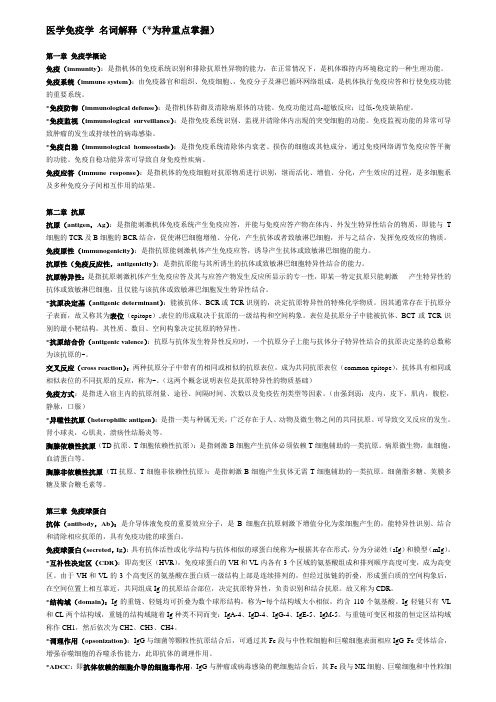
医学免疫学名词解释(*为种重点掌握)第一章免疫学概论免疫(immunity):是指机体的免疫系统识别和排除抗原性异物的能力,在正常情况下,是机体维持内环境稳定的一种生理功能。
免疫系统(immune system):由免疫器官和组织、免疫细胞、,免疫分子及淋巴循环网络组成,是机体执行免疫应答和行使免疫功能的重要系统。
*免疫防御(immunological defense):是指机体防御及清除病原体的功能。
免疫功能过高-超敏反应;过低-免疫缺陷症。
*免疫监视(immunological surveillance):是指免疫系统识别、监视并清除体内出现的突变细胞的功能。
免疫监视功能的异常可导致肿瘤的发生或持续性的病毒感染。
*免疫自稳(immunological homeostasis):是指免疫系统清除体内衰老、损伤的细胞或其他成分,通过免疫网络调节免疫应答平衡的功能。
免疫自稳功能异常可导致自身免疫性疾病。
免疫应答(immune response):是指机体的免疫细胞对抗原物质进行识别,继而活化、增值、分化,产生效应的过程,是多细胞系及多种免疫分子间相互作用的结果。
第二章抗原抗原(antigen,Ag):是指能刺激机体免疫系统产生免疫应答,并能与免疫应答产物在体内、外发生特异性结合的物质,即能与T 细胞的TCR及B细胞的BCR结合,促使淋巴细胞增殖、分化,产生抗体或者致敏淋巴细胞,并与之结合,发挥免疫效应的物质。
免疫原性(immunogenicity):是指抗原能刺激机体产生免疫应答,诱导产生抗体或致敏淋巴细胞的能力。
抗原性(免疫反应性,antigenicity):是指抗原能与其所诱生的抗体或致敏淋巴细胞特异性结合的能力。
抗原特异性:是指抗原刺激机体产生免疫应答及其与应答产物发生反应所显示的专一性,即某一特定抗原只能刺激产生特异性的抗体或致敏淋巴细胞,且仅能与该抗体或致敏淋巴细胞发生特异性结合。
*抗原决定基(antigenic determinant):能被抗体、BCR或TCR识别的,决定抗原特异性的特殊化学物质。
浙江大学医学免疫学名词解释
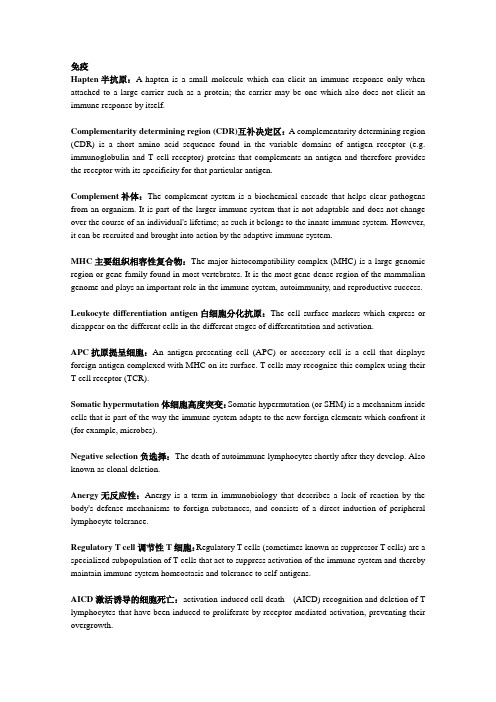
免疫Hapten半抗原:A hapten is a small molecule which can elicit an immune response only when attached to a large carrier such as a protein; the carrier may be one which also does not elicit an immune response by itself.Complementarity determining region (CDR)互补决定区:A complementarity determining region (CDR) is a short amino acid sequence found in the variable domains of antigen receptor (e.g. immunoglobulin and T cell receptor) proteins that complements an antigen and therefore provides the receptor with its specificity for that particular antigen.Complement补体:The complement system is a biochemical cascade that helps clear pathogens from an organism. It is part of the larger immune system that is not adaptable and does not change over the course of an individual's lifetime; as such it belongs to the innate immune system. However, it can be recruited and brought into action by the adaptive immune system.MHC主要组织相容性复合物:The major histocompatibility complex (MHC) is a large genomic region or gene family found in most vertebrates. It is the most gene-dense region of the mammalian genome and plays an important role in the immune system, autoimmunity, and reproductive success.Leukocyte differentiation antigen白细胞分化抗原:The cell surface markers which express or disappear on the different cells in the different stages of differentitation and activation.APC抗原提呈细胞:An antigen-presenting cell (APC) or accessory cell is a cell that displays foreign antigen complexed with MHC on its surface. T-cells may recognize this complex using their T-cell receptor (TCR).Somatic hypermutation体细胞高度突变:Somatic hypermutation (or SHM) is a mechanism inside cells that is part of the way the immune system adapts to the new foreign elements which confront it (for example, microbes).Negative selection负选择:The death of autoimmune lymphocytes shortly after they develop. Also known as clonal deletion.Anergy无反应性:Anergy is a term in immunobiology that describes a lack of reaction by the body's defense mechanisms to foreign substances, and consists of a direct induction of peripheral lymphocyte tolerance.Regulatory T cell调节性T细胞:Regulatory T cells (sometimes known as suppressor T cells) are a specialized subpopulation of T cells that act to suppress activation of the immune system and thereby maintain immune system homeostasis and tolerance to self-antigens.AICD激活诱导的细胞死亡:activation-induced cell death (AICD) recognition and deletion of T lymphocytes that have been induced to proliferate by receptor-mediated activation, preventing their overgrowth.。
医学免疫学名词解释
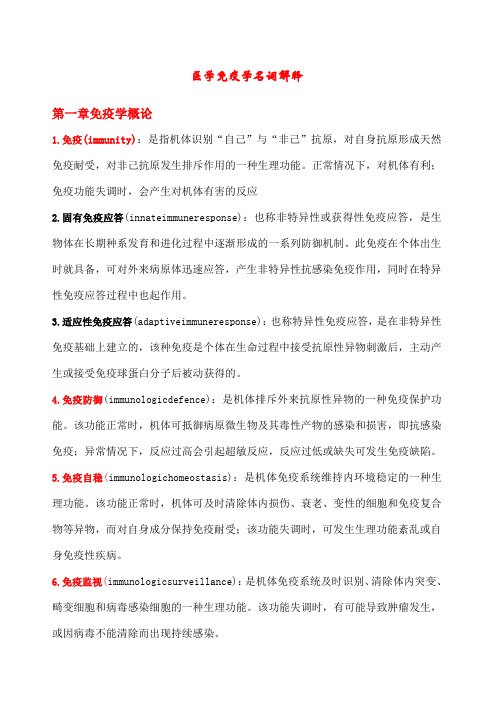
医学免疫学名词解释第一章免疫学概论1.免疫(immunity):是指机体识别“自己”与“非己”抗原,对自身抗原形成天然免疫耐受,对非己抗原发生排斥作用的一种生理功能。
正常情况下,对机体有利;免疫功能失调时,会产生对机体有害的反应2.固有免疫应答(innateimmuneresponse):也称非特异性或获得性免疫应答,是生物体在长期种系发育和进化过程中逐渐形成的一系列防御机制。
此免疫在个体出生时就具备,可对外来病原体迅速应答,产生非特异性抗感染免疫作用,同时在特异性免疫应答过程中也起作用。
3.适应性免疫应答(adaptiveimmuneresponse):也称特异性免疫应答,是在非特异性免疫基础上建立的,该种免疫是个体在生命过程中接受抗原性异物刺激后,主动产生或接受免疫球蛋白分子后被动获得的。
4.免疫防御(immunologicdefence):是机体排斥外来抗原性异物的一种免疫保护功能。
该功能正常时,机体可抵御病原微生物及其毒性产物的感染和损害,即抗感染免疫;异常情况下,反应过高会引起超敏反应,反应过低或缺失可发生免疫缺陷。
5.免疫自稳(immunologichomeostasis):是机体免疫系统维持内环境稳定的一种生理功能。
该功能正常时,机体可及时清除体内损伤、衰老、变性的细胞和免疫复合物等异物,而对自身成分保持免疫耐受;该功能失调时,可发生生理功能紊乱或自身免疫性疾病。
6.免疫监视(immunologicsurveillance):是机体免疫系统及时识别、清除体内突变、畸变细胞和病毒感染细胞的一种生理功能。
该功能失调时,有可能导致肿瘤发生,或因病毒不能清除而出现持续感染。
7.免疫应答:是医学免疫学的核心内容,免疫应答是指免疫系统识别和清除抗原的全过程。
8.医学免疫学:专门研究人体免疫系统结构与功能、免疫相关疾病发生机制以及免疫学诊断与防治方法的科学。
第二章免疫器官和免疫组织1.免疫细胞(immunecells):参与免疫应答或与免疫应答有关的细胞,如T细胞、B 细胞、单核巨噬细胞等。
免疫学名词解释
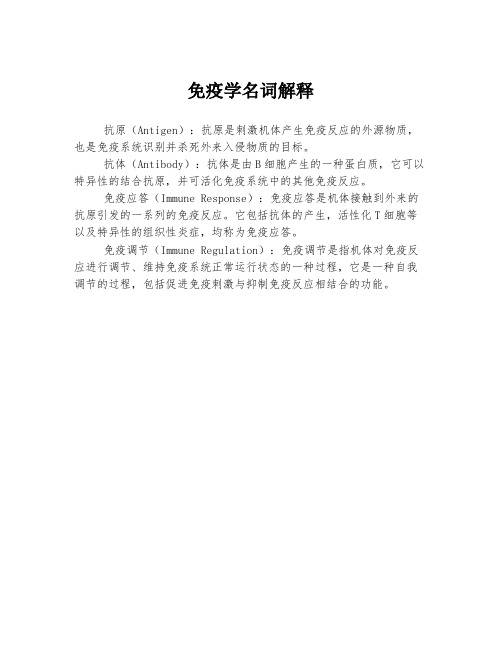
免疫学名词解释
抗原(Antigen):抗原是刺激机体产生免疫反应的外源物质,也是免疫系统识别并杀死外来入侵物质的目标。
抗体(Antibody):抗体是由B细胞产生的一种蛋白质,它可以特异性的结合抗原,并可活化免疫系统中的其他免疫反应。
免疫应答(Immune Response):免疫应答是机体接触到外来的抗原引发的一系列的免疫反应。
它包括抗体的产生,活性化T细胞等以及特异性的组织性炎症,均称为免疫应答。
免疫调节(Immune Regulation):免疫调节是指机体对免疫反应进行调节、维持免疫系统正常运行状态的一种过程,它是一种自我调节的过程,包括促进免疫刺激与抑制免疫反应相结合的功能。
医学免疫学名词解释
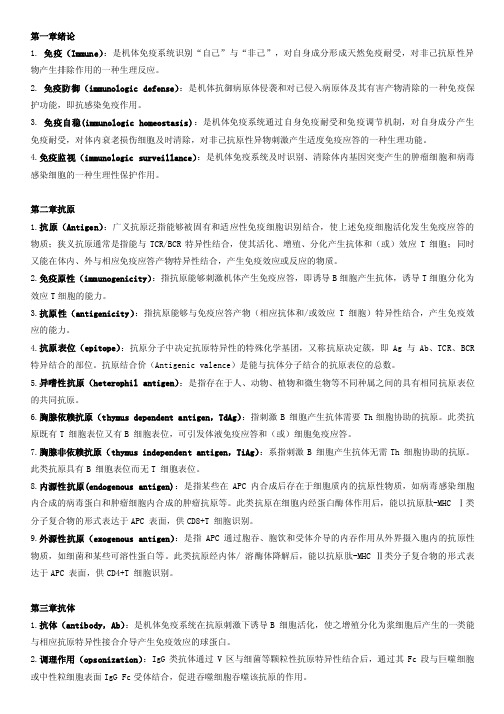
第一章绪论1. 免疫(Immune):是机体免疫系统识别“自己”与“非己”,对自身成分形成天然免疫耐受,对非己抗原性异物产生排除作用的一种生理反应。
2. 免疫防御(immunologic defense):是机体抗御病原体侵袭和对已侵入病原体及其有害产物清除的一种免疫保护功能,即抗感染免疫作用。
3. 免疫自稳(immunologic homeostasis):是机体免疫系统通过自身免疫耐受和免疫调节机制,对自身成分产生免疫耐受,对体内衰老损伤细胞及时清除,对非己抗原性异物刺激产生适度免疫应答的一种生理功能。
4.免疫监视(immunologic surveillance):是机体免疫系统及时识别、清除体内基因突变产生的肿瘤细胞和病毒感染细胞的一种生理性保护作用。
第二章抗原1.抗原(Antigen):广义抗原泛指能够被固有和适应性免疫细胞识别结合,使上述免疫细胞活化发生免疫应答的物质;狭义抗原通常是指能与TCR/BCR特异性结合,使其活化、增殖、分化产生抗体和(或)效应T 细胞;同时又能在体内、外与相应免疫应答产物特异性结合,产生免疫效应或反应的物质。
2.免疫原性(immunogenicity):指抗原能够刺激机体产生免疫应答,即诱导B细胞产生抗体,诱导T细胞分化为效应T细胞的能力。
3.抗原性(antigenicity):指抗原能够与免疫应答产物(相应抗体和/或效应T细胞)特异性结合,产生免疫效应的能力。
4.抗原表位(epitope):抗原分子中决定抗原特异性的特殊化学基团,又称抗原决定簇,即Ag与Ab、TCR、BCR 特异结合的部位。
抗原结合价(Antigenic valence)是能与抗体分子结合的抗原表位的总数。
5.异嗜性抗原(heterophil antigen):是指存在于人、动物、植物和微生物等不同种属之间的具有相同抗原表位的共同抗原。
6.胸腺依赖抗原(thymus dependent antigen,TdAg):指刺激B 细胞产生抗体需要Th细胞协助的抗原。
医学免疫学名词解释
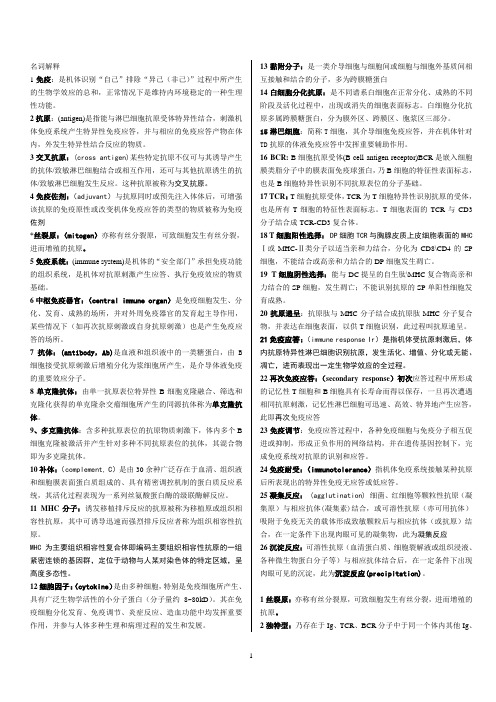
名词解释1免疫:是机体识别“自己”排除“异己(非己)”过程中所产生的生物学效应的总和,正常情况下是维持内环境稳定的一种生理性功能。
2抗原:(antigen)是指能与淋巴细胞抗原受体特异性结合,刺激机体免疫系统产生特异性免疫应答,并与相应的免疫应答产物在体内,外发生特异性结合反应的物质。
3交叉抗原:(cross antigen)某些特定抗原不仅可与其诱导产生的抗体/致敏淋巴细胞结合或相互作用,还可与其他抗原诱生的抗体/致敏淋巴细胞发生反应。
这种抗原被称为交叉抗原。
4免疫佐剂:(adjuvant)与抗原同时或预先注入体体后,可增强该抗原的免疫原性或改变机体免疫应答的类型的物质被称为免疫佐剂*丝裂原:(mitogen)亦称有丝分裂原,可致细胞发生有丝分裂,进而增殖的抗原。
5免疫系统:(immune system)是机体的“安全部门”承担免疫功能的组织系统,是机体对抗原刺激产生应答、执行免疫效应的物质基础。
6中枢免疫器官:(central immune organ)是免疫细胞发生、分化、发育、成熟的场所,并对外周免疫器官的发育起主导作用,某些情况下(如再次抗原刺激或自身抗原刺激)也是产生免疫应答的场所。
7抗体:(antibody,Ab)是血液和组织液中的一类糖蛋白,由B 细胞接受抗原刺激后增殖分化为浆细胞所产生,是介导体液免疫的重要效应分子。
8单克隆抗体:由单一抗原表位特异性B细胞克隆融合、筛选和克隆化获得的单克隆杂交瘤细胞所产生的同源抗体称为单克隆抗体。
9、多克隆抗体:含多种抗原表位的抗原物质刺激下,体内多个B 细胞克隆被激活并产生针对多种不同抗原表位的抗体,其混合物即为多克隆抗体。
10补体:(complement, C)是由30余种广泛存在于血清、组织液和细胞膜表面蛋白质组成的、具有精密调控机制的蛋白质反应系统,其活化过程表现为一系列丝氨酸蛋白酶的级联酶解反应。
11 MHC分子:诱发移植排斥反应的抗原被称为移植原或组织相容性抗原,其中可诱导迅速而强烈排斥反应者称为组织相容性抗原。
(完整版)医学免疫学名词解释
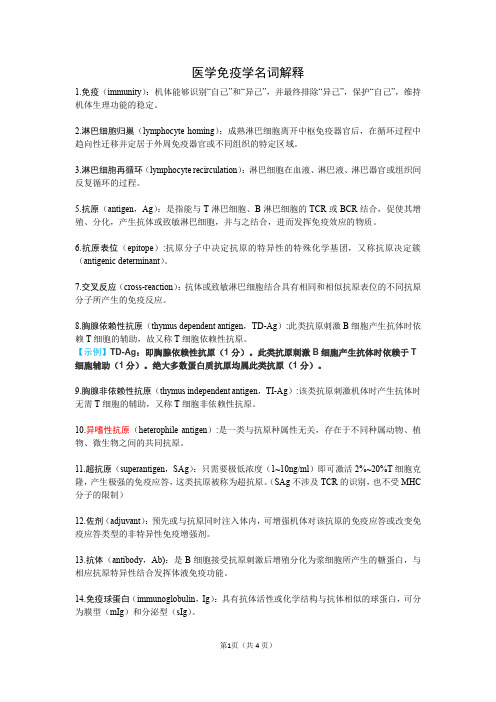
医学免疫学名词解释1.免疫(immunity):机体能够识别“自己”和“异己”,并最终排除“异己”,保护“自己”,维持机体生理功能的稳定。
2.淋巴细胞归巢(lymphocyte homing):成熟淋巴细胞离开中枢免疫器官后,在循环过程中趋向性迁移并定居于外周免疫器官或不同组织的特定区域。
3.淋巴细胞再循环(lymphocyte recirculation):淋巴细胞在血液、淋巴液、淋巴器官或组织间反复循环的过程。
5.抗原(antigen,Ag):是指能与T淋巴细胞、B淋巴细胞的TCR或BCR结合,促使其增殖、分化,产生抗体或致敏淋巴细胞,并与之结合,进而发挥免疫效应的物质。
6.抗原表位(epitope):抗原分子中决定抗原的特异性的特殊化学基团,又称抗原决定簇(antigenic determinant)。
7.交叉反应(cross-reaction):抗体或致敏淋巴细胞结合具有相同和相似抗原表位的不同抗原分子所产生的免疫反应。
8.胸腺依赖性抗原(thymus dependent antigen,TD-Ag):此类抗原刺激B细胞产生抗体时依赖T细胞的辅助,故又称T细胞依赖性抗原。
【示例】TD-Ag:即胸腺依赖性抗原(1分)。
此类抗原刺激B细胞产生抗体时依赖于T 细胞辅助(1分)。
绝大多数蛋白质抗原均属此类抗原(1分)。
9.胸腺非依赖性抗原(thymus independent antigen,TI-Ag):该类抗原刺激机体时产生抗体时无需T细胞的辅助,又称T细胞非依赖性抗原。
10.异嗜性抗原(heterophile antigen):是一类与抗原种属性无关,存在于不同种属动物、植物、微生物之间的共同抗原。
11.超抗原(superantigen,SAg):只需要极低浓度(1~10ng/ml)即可激活2%~20%T细胞克隆,产生极强的免疫应答,这类抗原被称为超抗原。
(SAg不涉及TCR的识别,也不受MHC 分子的限制)12.佐剂(adjuvant):预先或与抗原同时注入体内,可增强机体对该抗原的免疫应答或改变免疫应答类型的非特异性免疫增强剂。
医学免疫学名词解释

《医学免疫学》名词解释1.免疫:机体识别和排除抗原性异物的功能2.抗原:能刺激机体的免疫系统发生免疫应答,并能与免疫应答产物发生特异性结合的物质。
3.表位(抗原决定簇):抗原分子中决定抗原特异性的特殊化学基团。
4.半抗原:某些小分子物质只可与应答产物特异性结合,而不能刺激机体产生免疫应答。
即只具备免疫反应性,不具备免疫原性的物质。
5.异嗜性抗原:存在于人、动物、微生物等不同种属之间的共同抗原。
6.佐剂:预先或与抗原同时注入体内,可增强机体对抗原的免疫应答或改变免疫应答类型的非特异性免疫增强物质。
7.抗体:免疫系统在抗原刺激下,由B淋巴细胞或记忆B细胞增殖分化成的浆细胞所产生的、可与相应抗原发生特异性结合的免疫球蛋白。
8.免疫球蛋白:血清中一类主要的蛋白,由α1、α2、β和γ球蛋白组成。
9.高变区(HVR):VH和VL中3个氨基酸组成和排列顺序高度可变的区域。
10.单克隆抗体:由单一杂交瘤细胞产生,针对单一抗原表位的特异性抗原。
11.抗体依赖的细胞介导的细胞毒作用(ADCC):抗体Fab段结合病毒感染的细胞或肿瘤细胞表面的抗原表位,其Fc段与杀伤细胞表面的FcR结合,介导杀伤细胞直接杀伤靶细胞。
12.互补性决定区(CDR):VH和VL中的3个可形成与抗原表位互补的空间构象的区域。
13.补体:正常人或动物体液中存在的一组与免疫有关,并具有免疫活性的免疫球蛋白。
14.膜攻击复合物(MAC):由补体系统的C5b~C9组成的复合物,可牢固附着于靶细胞表面,最终造成靶细胞死亡溶解。
15.细胞因子:由免疫细胞及组织细胞分泌的具有生物学活性的小分子蛋白。
16.CSF(集落刺激因子):能刺激多能造血干细胞和不同发育分化阶段的造血祖细胞分化、增殖的细胞因子。
17.IL(白细胞介素):是由白细胞产生的又介导白细胞之间相互作用的一些细胞因子。
18.TNF(肿瘤坏死因子):由单核巨噬细胞与活化T细胞产生的,能造成肿瘤直接死亡的细胞因子。
医学免疫学名词解释
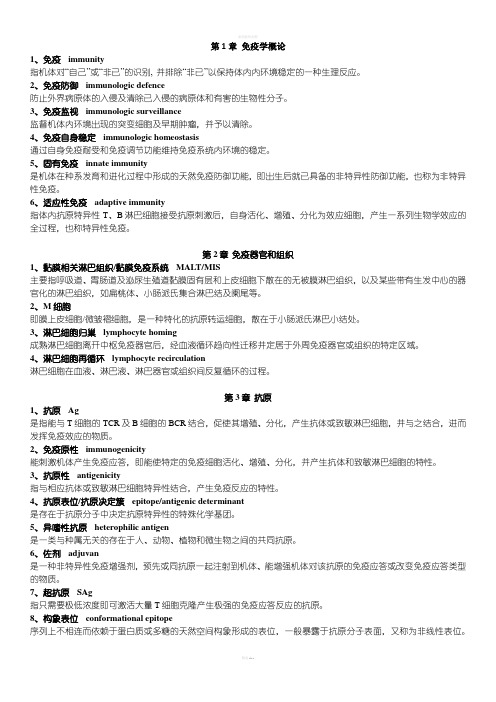
第1章免疫学概论1、免疫immunity指机体对“自己”或“非已”的识别, 并排除“非已”以保持体内内环境稳定的一种生理反应。
2、免疫防御immunologic defence防止外界病原体的入侵及清除已入侵的病原体和有害的生物性分子。
3、免疫监视immunologic surveillance监督机体内环境出现的突变细胞及早期肿瘤,并予以清除。
4、免疫自身稳定immunologic homeostasis通过自身免疫耐受和免疫调节功能维持免疫系统内环境的稳定。
5、固有免疫innate immunity是机体在种系发育和进化过程中形成的天然免疫防御功能,即出生后就已具备的非特异性防御功能,也称为非特异性免疫。
6、适应性免疫adaptive immunity指体内抗原特异性T、B淋巴细胞接受抗原刺激后,自身活化、增殖、分化为效应细胞,产生一系列生物学效应的全过程,也称特异性免疫。
第2章免疫器官和组织1、黏膜相关淋巴组织/黏膜免疫系统MALT/MIS主要指呼吸道、胃肠道及泌尿生殖道黏膜固有层和上皮细胞下散在的无被膜淋巴组织,以及某些带有生发中心的器官化的淋巴组织,如扁桃体、小肠派氏集合淋巴结及阑尾等。
2、M细胞即膜上皮细胞/微皱褶细胞,是一种特化的抗原转运细胞,散在于小肠派氏淋巴小结处。
3、淋巴细胞归巢lymphocyte homing成熟淋巴细胞离开中枢免疫器官后,经血液循环趋向性迁移并定居于外周免疫器官或组织的特定区域。
4、淋巴细胞再循环lymphocyte recirculation淋巴细胞在血液、淋巴液、淋巴器官或组织间反复循环的过程。
第3章抗原1、抗原Ag是指能与T细胞的TCR及B细胞的BCR结合,促使其增殖、分化,产生抗体或致敏淋巴细胞,并与之结合,进而发挥免疫效应的物质。
2、免疫原性immunogenicity能刺激机体产生免疫应答,即能使特定的免疫细胞活化、增殖、分化,并产生抗体和致敏淋巴细胞的特性。
免疫学名词解释
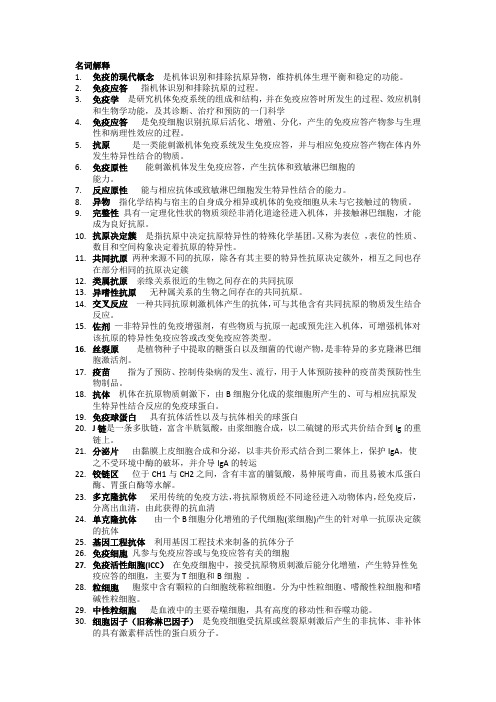
30.细胞因子(旧称淋巴因子)是免疫细胞受抗原或丝裂原刺激后产生的非抗体、非补体的具有激素样活性的蛋白质分子。
31.免疫应答指机体免疫系统受到抗原物质刺激后,免疫细胞对抗原分子的识别并产生一系列复杂的免疫反应的生物学过程。
32.杀伤细胞简称K细胞,其主要特点是细胞表面具有IgG的Fc受体。
33.抗体依赖性细胞介导的细胞毒作用(ADCC)当靶细胞与相应的IgG结合,K细胞可与结合在靶细胞上的IgG的Fc结合,释放细胞毒,裂解靶细胞。
41.免疫重建将免疫功能正常个体的造血干细胞或淋巴细胞移植给患有免疫功能缺陷的个体,使后者的免疫功能全部或部分得到恢复。
42.超敏反应指机体再次接触相同抗原时,发生以生理功能紊乱或组织细胞损伤为表现的特异性免疫应答异常
43.Ⅱ型超敏反应由循环抗体与细胞表面或基底膜上的抗原结合,通过免疫调理、激活补体和ADCC损伤组织的疾病
免疫系统的三大功能
功能正常表现
免疫防御抗感染
(immunologicdefense)
免疫稳定消除炎症或衰老细胞
(immunologichomeostasis)
免疫监视防止正常细胞突变
(immunologic surveillance)、
免疫学特性:①组成简单;②功能明确;③效应明显;④应答连续;⑤利弊共存。
22.铰链区位于CH1与CH2之间,含有丰富的脯氨酸,易伸展弯曲,而且易被木瓜蛋白酶、胃蛋白酶等水解。
23.多克隆抗体采用传统的免疫方法,将抗原物质经不同途径进入动物体内,经免疫后,分离出血清,由此获得的抗血清
24.单克隆抗体由一个B细胞分化增殖的子代细胞(浆细胞)产生的针对单一抗原决定簇的抗体
25.基因工程抗体利用基因工程技术来制备的抗体分子
医学免疫学名词解释(全)
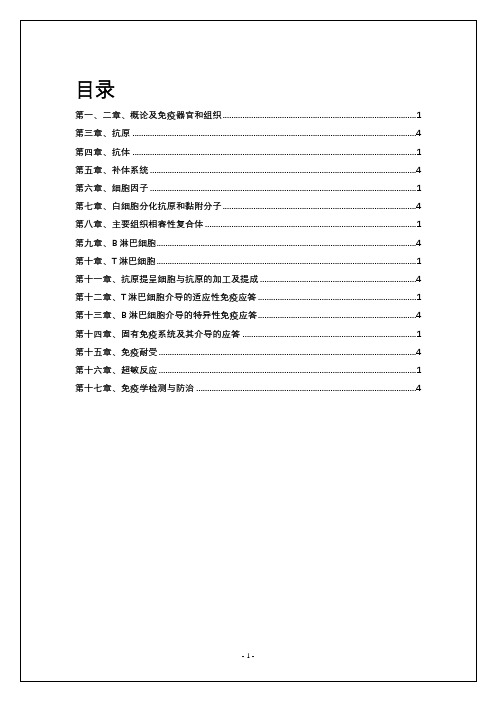
目录第一、二章、概论及免疫器官和组织 (1)第三章、抗原 (4)第四章、抗体 (1)第五章、补体系统 (4)第六章、细胞因子 (1)第七章、白细胞分化抗原和黏附分子 (4)第八章、主要组织相容性复合体 (1)第九章、B淋巴细胞 (4)第十章、T淋巴细胞 (1)第十一章、抗原提呈细胞与抗原的加工及提成 (4)第十二章、T淋巴细胞介导的适应性免疫应答 (1)第十三章、B淋巴细胞介导的特异性免疫应答 (4)第十四章、固有免疫系统及其介导的应答 (1)第十五章、免疫耐受 (4)第十六章、超敏反应 (1)第十七章、免疫学检测与防治 (4)医学免疫学名词解释(全)第一、二章、概论及免疫器官和组织1.医学免疫学:研究人体免疫系统的结构和功能的科学。
2.免疫防御:体内免疫系统防止外界病原体入侵或清除已入侵病原体及其他有害物质的功能。
3.免疫监视:体内免疫系统随时发现和清除体内出现的非几成分的功能。
4.免疫自身稳定:体内免疫系统通过自身免疫耐受和免疫调节两种主要机制来达到免疫系统内环境稳态的功能。
5.免疫应答:免疫系统识别和清除非己物质的整个过程。
6免疫(immunity):机体识别和排除抗原性异物(免疫防御+免疫监视),对自身成分形成耐受,维持机体生理平衡和稳定的功能(免疫自身稳定)。
7.中枢免疫器官:是免疫细胞发生、分化、发育和成熟的场所。
人或其他哺乳类动物的中枢免疫器官包括骨髓和胸腺。
8.骨髓:各类血细胞的发源地,也是人和哺乳动物B细胞发育成熟的场所。
9.胸腺:T细胞分化、发育、成熟的场所。
10.外周免疫器官:成熟淋巴细胞成熟的场所,也是各类淋巴细胞对外来抗原产生免疫应答的主要部位。
外周免疫器官和组织包括淋巴结、脾和粘膜相关淋巴组织等。
11.免疫系统:由免疫器官、免疫细胞和免疫分子组成,其功能是执行免疫功能。
第三章、抗原1.抗原(antigen,Ag):能够刺激机体产生特异性免疫应答,并能与效应产物发生特异性结合的物质。
医学免疫学名词解释

医学免疫学名词解释第一章免疫学概论1.免疫(immunity):是指机体识别“自己”与“非己”抗原,对自身抗原形成天然免疫耐受,对非己抗原发生排斥作用的一种生理功能。
正常情况下,对机体有利;免疫功能失调时,会产生对机体有害的反应2.固有免疫应答(innate immune response):也称非特异性或获得性免疫应答,是生物体在长期种系发育和进化过程中逐渐形成的一系列防御机制。
此免疫在个体出生时就具备,可对外来病原体迅速应答,产生非特异性抗感染免疫作用,同时在特异性免疫应答过程中也起作用。
3.适应性免疫应答(adaptive immune response):也称特异性免疫应答,是在非特异性免疫基础上建立的,该种免疫是个体在生命过程中接受抗原性异物刺激后,主动产生或接受免疫球蛋白分子后被动获得的。
4.免疫防御(immunologic defence):是机体排斥外来抗原性异物的一种免疫保护功能。
该功能正常时,机体可抵御病原微生物及其毒性产物的感染和损害,即抗感染免疫;异常情况下,反应过高会引起超敏反应,反应过低或缺失可发生免疫缺陷。
5.免疫自稳(immunologic homeostasis):是机体免疫系统维持内环境稳定的一种生理功能。
该功能正常时,机体可及时清除体内损伤、衰老、变性的细胞和免疫复合物等异物,而对自身成分保持免疫耐受;该功能失调时,可发生生理功能紊乱或自身免疫性疾病。
6.免疫监视(immunologic surveillance):是机体免疫系统及时识别、清除体内突变、畸变细胞和病毒感染细胞的一种生理功能。
该功能失调时,有可能导致肿瘤发生,或因病毒不能清除而出现持续感染。
7.免疫应答:是医学免疫学的核心内容,免疫应答是指免疫系统识别和清除抗原的全过程。
8.医学免疫学:专门研究人体免疫系统结构与功能、免疫相关疾病发生机制以及免疫学诊断与防治方法的科学。
第二章免疫器官和免疫组织1.免疫细胞(immune cells):参与免疫应答或与免疫应答有关的细胞,如T细胞、B细胞、单核巨噬细胞等。
医学免疫学名词解释(1)
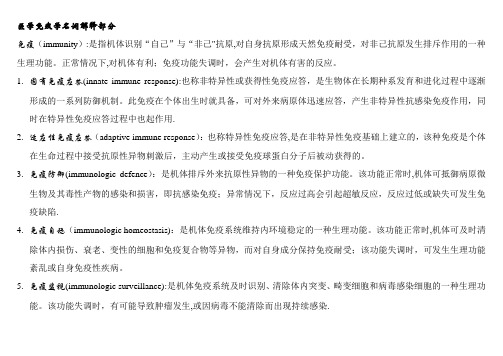
医学免疫学名词解释部分免疫(immunity):是指机体识别“自己”与“非己"抗原,对自身抗原形成天然免疫耐受,对非己抗原发生排斥作用的一种生理功能。
正常情况下,对机体有利;免疫功能失调时,会产生对机体有害的反应。
1.固有免疫应答(innate immune response):也称非特异性或获得性免疫应答,是生物体在长期种系发育和进化过程中逐渐形成的一系列防御机制。
此免疫在个体出生时就具备,可对外来病原体迅速应答,产生非特异性抗感染免疫作用,同时在特异性免疫应答过程中也起作用.2.适应性免疫应答(adaptive immune response):也称特异性免疫应答,是在非特异性免疫基础上建立的,该种免疫是个体在生命过程中接受抗原性异物刺激后,主动产生或接受免疫球蛋白分子后被动获得的。
3.免疫防御(immunologic defence):是机体排斥外来抗原性异物的一种免疫保护功能。
该功能正常时,机体可抵御病原微生物及其毒性产物的感染和损害,即抗感染免疫;异常情况下,反应过高会引起超敏反应,反应过低或缺失可发生免疫缺陷.4.免疫自稳(immunologic homeostasis):是机体免疫系统维持内环境稳定的一种生理功能。
该功能正常时,机体可及时清除体内损伤、衰老、变性的细胞和免疫复合物等异物,而对自身成分保持免疫耐受;该功能失调时,可发生生理功能紊乱或自身免疫性疾病。
5.免疫监视(immunologic surveillance):是机体免疫系统及时识别、清除体内突变、畸变细胞和病毒感染细胞的一种生理功能。
该功能失调时,有可能导致肿瘤发生,或因病毒不能清除而出现持续感染.6.MALT(mucosal—associated lymphoid tissue):即黏膜伴随的淋巴组织.是指分布在呼吸道、肠道及泌尿生殖道的粘膜上皮细胞下的无包膜的淋巴组织.除执行固有免疫外,还可执行局部特异性免疫.7.抗体(Antibody) :是B 细胞特异性识别Ag后,增殖分化成为浆细胞,所合成分泌的一类能与相应抗原特异性结合的、具有免疫功能的球蛋白。
- 1、下载文档前请自行甄别文档内容的完整性,平台不提供额外的编辑、内容补充、找答案等附加服务。
- 2、"仅部分预览"的文档,不可在线预览部分如存在完整性等问题,可反馈申请退款(可完整预览的文档不适用该条件!)。
- 3、如文档侵犯您的权益,请联系客服反馈,我们会尽快为您处理(人工客服工作时间:9:00-18:30)。
Immune response: the response made by the host to defend itself against the introduction of foreign substances.Antigen: An antigen is any agent capable of binding specifically to components of immune system, such as BCR and soluble antibodiesImmunogen - A substance that induces a specific immune response.(All immunogens are antigens, but not all antigens are immunogens)Hapten:A hapten is a small molecule which could never induce an immune response when administered by themselves, but which can when attached to a large carrier such as a protein. Haptens have the property of antigencity but not immunogenicity.Antigenicity: The ability of a compound to bind with antibodies or cells of the immune system. This binding is highly specific.Epitope: The portion of the antigen that binds specifically with the binding site of an antibody or a receptor on a lymphocyte. Epitopes determine the specificity of different antigens.Adjuvants: A substance that when mixed with an immunogen, enhances the immune response against the immunogen.Complement:A group of serum proteins involved in the control of inflammation, the activation of phagocytes and the lytic attack on cell membranes. It belongs to the innate immune system, and can be recruited and brought into action by the adaptive immune system.MHC:A cluster of genes on chromosome 6 in humans, encoding cell surface molecules that are polymorphic and that code for antigens which lead to rapid graft rejection between members of a single species which differ at these loci. They play an important role in the immune response, autoimmunity, and reproductive success.Cytokine (CK): Small soluble proteins that mediate immune and inflammatory reactions and are responsible for communications between leukocytes and other cells.Cytokine storm: Under certain circumstances (e.g. septic shock), large amounts of CKs (such as TNF) are produced, they may be active distant from their site of secretion.Leukocyte differentiation antigens: Cell surface molecules which may appear on or disappear from the cell membrane of leukocytes in the different stages of differentiation and activation. They can also be found on other cells.Cluster of differentiation (CD): Cell surface molecules can be recognized by particular monoclonal antibodies. All of the monoclonal antibodies that react with a particular membrane molecule are grouped together as a cluster of differentiationCell adhesion molecules, CAM: A group of proteins involved in adhesion of cell to cell or cell to extracellular matrix (ECM), such as ICAM-1, ICAM-2, ICAM-3, VCAM-1 and PECAM etc.APC:A variety of cell types specialized in the presentation of peptide-MHC to lymphocytes, causing either tolerance or immunity.Somatic hypermutation:Somatic hypermutation (or SHM) is a mechanism inside cells that is part of the way the immune system adapts to the new foreign elements which confront it (for example, microbes).Negative selection:Cells that bind to MHC-Ag on thymic stroma cells (or auto-reactive T cells, ART) will undergo apoptosis. Formation of central immune tolerancePositive selection: Double positive cells that bind, with moderate affinity, to MHC-Ag on thymic stroma cells survive. DP cell acquire MHC restriction though positive selection.Anergy:Anergy is a term in immunobiology that describes a lack of reaction by the body's defense mechanisms to foreign substances, and consists of a direct induction of peripheral lymphocyte tolerance.Regulatory T cell:Regulatory T cells (sometimes known as suppressor T cells) are a specialized subpopulation of T cells that act to suppress activation of the immune system and thereby maintain immune system homeostasis and tolerance to self-antigens.AICD:activation-induced cell death (AICD) recognition and deletion of T lymphocytes that have been induced to proliferate by receptor-mediated activation, preventing their overgrowth.ELISA (Enzyme linked immuno-sorbent assay) An immunological test, using an enzyme as a label to determine presence of target protein.ELISPOT (Enzyme-linked immuno-sorbent spot) A common method for monitoring immune responses in humans and animals. At appropriate conditions the ELISPOT assay allows visualization of the secretary product of individual activated or responding cells.Secondary Antibody: An antibody that binds to primary antibodies or antibody fragments. They are typically labeled with probes that make them useful for detection, purification or cell sorting applications.Artificial active immunization: Administration of an antigen for active production of immunity. Active immunization results in the production of antibodies directed against the infecting agent or its toxic products; it may also initiate cellular immunity.Vaccine: Administration of an antigen for active production of immunity is called artificial active immunization. The agent used for artificial active immunization is called vaccine.Artificial passive immunization:Immunization may be accomplished passively by administering either performed immunoreactive serum (Abs, CKs) or cells.Planned immunization: A rational program of childhood immunization against infectious disease, when many of the most damaging and preventable infections normally appear.。
